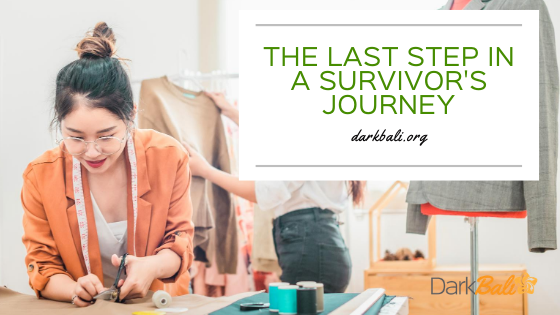Do you like your job?”
The random question was directed at me. There was a lightheartedness in the tone that fit the playful mood that we were in, but there was also a depth to the question that needed a real answer. The question came from a young woman I supervised in our Freedom Business. She and her co-workers were all recent survivors of human trafficking and were getting back on their feet through employment in our company. All of the women turned to me, waiting to hear what I had to say. Luckily, this was not a difficult question to answer.
Meeting the asker’s eyes, I replied, “I do like my job. Don’t get me wrong. Sometimes you all drive me a little crazy, but it’s pretty cool to get a front row seat around people in the process of transformation. I’ve watched all of you taking these amazing steps forward in your lives. It’s special to get to see that and to get to play a small part in it. Yeah. I like my job.”
The conversation moved on, but I have been thinking about it for days. My answer was honest, but it wasn’t complete. The full truth is that I don’t just like my job; I love it. I positively ache with love for the women whom I employ, and I am incredibly proud of them. Sometimes I cry for them on my way home from work because there is simply nothing else to do but hold the stories they’ve shared and grieve for what they’ve endured and the injustice of it all. They are worth crying for when their own tears have long since given way to the shrug of acceptance. I also cry for how brave they are – how they continue to get back on their feet setback after setback, under the weight of pressures that would incapacitate me. Their resilience takes my breath away, and I admire and respect them in a thousand ways. What is the most spectacular to me is that they have not lost their humanity in a world that tried its best to take it from them. Instead, they move forward with determination, self-compassion, and a heaping dose of humor.
The other day I was listening to a lecture by a trauma researcher, and I went back to read some of her work because I was so struck by one of her statements. In one of her academic papers, she wrote, “Trauma recovery could therefore focus on processes of accepting victimhood and innocence (in response to shame), building community (in response to a loss of a sense of common humanity) and developing a new identity and purpose that incorporates the experiences of slavery (in response to a sense of stunted growth).” Or to put it more clearly, recovery requires the (re)creation of community, control, and meaning in a survivor’s life that doesn’t shy away from their traumas but builds on them.
Freedom Businesses offer employment to survivors of human trafficking, but this is really the means to a more important end. It is not the goal. The workplace is the environment where our employees with trafficking experiences are able to regain a sense of control and self-direction. It is where they have the space and encouragement to make meaning of both their pasts and futures. It is where they hear “me too” maybe for the first time and find their experiences and struggles normalized and honored not as a liability but as evidence of their resilience.
The more I think about it, the less I like my title of “supervisor.” I think “midwife” might be more accurate. Isn’t that really what ALL caregivers in this space do? We stand by while our survivor employees do the hard labor, making sure that the environment is safe and that they have what they need to progress. We give encouragement and make contingencies for emergencies, and we have to determine when to offer a sympathetic hug or a firm word of reality. Mostly, what we do is remind them: Don’t stop now! You’re so close. This is the hardest part. New life is almost here.
(Freedom Businesses are an integral part of the anti-trafficking community, often standing at the end of a long healing journey with survivors as well as offering prevention-related employment to vulnerable communities. Several Freedom Businesses are a part of the Dark Bali coalition. We are glad to equip them with training in trauma, visibility about their products, and connections with the anti-trafficking community throughout Indonesia (which enable survivors to move from safehouses to employment and reintegration more easily). You can find out more about these partners on our connect page and help us serve them by becoming a monthly donor through our Impact Team.)






